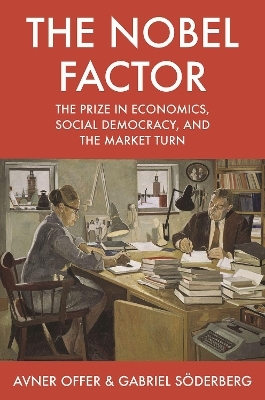
The Nobel Factor
The Prize in Economics, Social Democracy, and the Market Turn
Seiten
2019
Princeton University Press (Verlag)
978-0-691-19631-2 (ISBN)
Princeton University Press (Verlag)
978-0-691-19631-2 (ISBN)
How the creation of the Nobel Prize in Economics changed the economics profession, Sweden, and the worldOur confidence in markets comes from economics, and our confidence in economics is underpinned by the Nobel Prize in Economics, which was first awarded in 1969. Was it a coincidence that the prize and the rise of free-market liberalism began
How the creation of the Nobel Prize in Economics changed the economics profession, Sweden, and the world
Our confidence in markets comes from economics, and our confidence in economics is underpinned by the Nobel Prize in Economics, which was first awarded in 1969. Was it a coincidence that the prize and the rise of free-market liberalism began at the same time? The Nobel Factor is the first book to describe the origins and power of the most important prize in economics. It tells how the prize, created by the Swedish central bank, emerged from a conflict between central bank orthodoxy and Sweden's social democracy. The aim was to use the halo of the Nobel brand to influence the future of Sweden and the rest of the developed world by enhancing the bank's authority and the prestige of market-friendly economics. And the strategy has worked spectacularly—with sometimes disastrous results for societies striving to cope with the requirements of economic theory and deregulated markets. Drawing on previously untapped archives and providing a unique analysis of the sway of prizewinners, The Nobel Factor offers an unprecedented account of the real-world consequences of economics and its greatest prize.
How the creation of the Nobel Prize in Economics changed the economics profession, Sweden, and the world
Our confidence in markets comes from economics, and our confidence in economics is underpinned by the Nobel Prize in Economics, which was first awarded in 1969. Was it a coincidence that the prize and the rise of free-market liberalism began at the same time? The Nobel Factor is the first book to describe the origins and power of the most important prize in economics. It tells how the prize, created by the Swedish central bank, emerged from a conflict between central bank orthodoxy and Sweden's social democracy. The aim was to use the halo of the Nobel brand to influence the future of Sweden and the rest of the developed world by enhancing the bank's authority and the prestige of market-friendly economics. And the strategy has worked spectacularly—with sometimes disastrous results for societies striving to cope with the requirements of economic theory and deregulated markets. Drawing on previously untapped archives and providing a unique analysis of the sway of prizewinners, The Nobel Factor offers an unprecedented account of the real-world consequences of economics and its greatest prize.
Avner Offer is Chichele Professor Emeritus of Economic History at the University of Oxford and a fellow of All Souls College and the British Academy. Gabriel Söderberg is a researcher in the Department of Economic History at Uppsala University in Sweden.
| Erscheinungsdatum | 27.11.2019 |
|---|---|
| Zusatzinfo | 31 b/w illus. 1 table. |
| Verlagsort | New Jersey |
| Sprache | englisch |
| Maße | 156 x 235 mm |
| Themenwelt | Geisteswissenschaften ► Geschichte ► Regional- / Ländergeschichte |
| Geschichte ► Teilgebiete der Geschichte ► Wirtschaftsgeschichte | |
| Sozialwissenschaften ► Politik / Verwaltung ► Staat / Verwaltung | |
| ISBN-10 | 0-691-19631-1 / 0691196311 |
| ISBN-13 | 978-0-691-19631-2 / 9780691196312 |
| Zustand | Neuware |
| Informationen gemäß Produktsicherheitsverordnung (GPSR) | |
| Haben Sie eine Frage zum Produkt? |
Mehr entdecken
aus dem Bereich
aus dem Bereich
Macht und Herrschaft im Zarenreich
Buch | Hardcover (2024)
C.H.Beck (Verlag)
CHF 69,85


